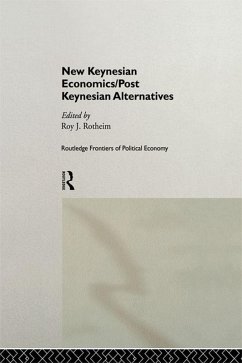
Empirical Post Keynesian Economics (eBook, PDF)
Looking at the Real World
Versandkostenfrei!
Sofort per Download lieferbar
49,95 €
inkl. MwSt.
Weitere Ausgaben:

PAYBACK Punkte
25 °P sammeln!
This text highlights the major empirical questions and issues facing Post Keynesian economics today. Featuring contributions by leading Post Keynesian economists, it focuses on public policy and real-life analysis of this vibrant and dynamic economic theory. In language that is accessible to upper-level undergraduate and graduate students, professional economists, and public policy makers, each of the chapters takes on a specific issue of concern to all professional economists, provides empirical analysis of the issue, and then discusses the Post Keynesian view on the topic and contrasts it wi...
This text highlights the major empirical questions and issues facing Post Keynesian economics today. Featuring contributions by leading Post Keynesian economists, it focuses on public policy and real-life analysis of this vibrant and dynamic economic theory. In language that is accessible to upper-level undergraduate and graduate students, professional economists, and public policy makers, each of the chapters takes on a specific issue of concern to all professional economists, provides empirical analysis of the issue, and then discusses the Post Keynesian view on the topic and contrasts it with the orthodox perspective. The topics covered are grouped into three main categories: empirical studies of consumption; empirical studies of business investment; and empirical studies of international economic relations.
Dieser Download kann aus rechtlichen Gründen nur mit Rechnungsadresse in A, B, BG, CY, CZ, D, DK, EW, E, FIN, F, GR, HR, H, IRL, I, LT, L, LR, M, NL, PL, P, R, S, SLO, SK ausgeliefert werden.













